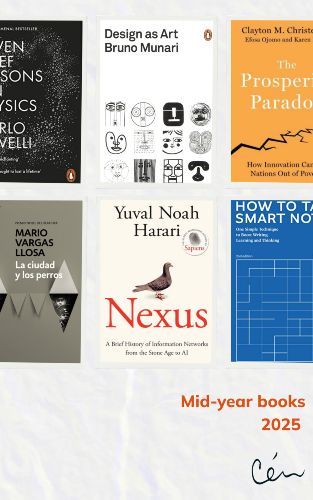2025 mid-year books
#263 - Aug.2025
A bit late for a mid-year book review but I didn’t want to skip this simple ritual, as in previous years.
I’m writing this post with a vacation vibe. I’m currently taking some days off to recharge. Menorca has been a great host for this!
Before we get into the mid-year book checkpoint, wanted to share a couple of reflections of ideas that had been shaping my reading this year.
- Understanding our humanity. In the middle of a tech/AI rush it’s easy to forget the basics: What makes us human?
- Technology leverage.What leverage can we get from today’s technologies to tackle the most challenging world problems?
- Humans abilities. What are the skills that will make the difference in a future where we delegate many daily tasks to machines?
I think this is why I’ve been revisiting a couple of books that I read in the past. When you like a book, reading them again gives you new perspectives; they outlive their times and become recurrent sources of inspiration!

These are the books I’ve read so far in 2025:
- Awareness (Anthony de Mello): Reading this book to start every year has become a routine! De Mello teaches that most of our suffering comes from wanting reality to be different than it is.
- A Morte é um Dia Que Vale a Pena Viver (Ana Cláudia Quintana Arantes): A profound book. The author explains how death teaches us how to live by forcing us to confront what truly matters.
- How to Take Smart Notes (Sönke Ahrens): If you are a productivity hacker this could be for you. Over the years I’ve struggle to organize my notes and this bring a very practical approach to solve this problem.
- Redescubrir la vida (Anthony de Mello): 2nd book of De Mello. Great perspective of what life is about and the power of wonder.
- Ways of Seeing (John Berger): This was an interesting book that navigates across different art disciplines and how to teach your eyes on how to “see” beyond the common appearances.
- La ciudad y los perros (Mario Vargas Llosa): What a novel! It’s like being in a movie. A powerful and engaging story that only Vargas Llosa was able to put together in such a beautiful prose.
- Nexus (Yuval Noah Harari): This was a long and insightful book. Harari has been famous for calling out the risks about AI. I was curious to understand why. The book makes a good job explaining the reasons. Some of them I truly agree.
- Design as Art (Bruno Munari): Another re-read of this year, returning to the basics of design. Good design isn’t decoration; it’s communication that makes life more meaningful and accessible.
- The Prosperity Paradox (Clayton M. Christensen): This book is eye-opening about what true innovation is about and the power of new markets that are often ignored by many people. Opportunities often come from the “non-consumers”.
- Seven Brief Lessons on Physics (Carlo Rovelli): A short and engaging book that bring simplicity over the complexity (and beauty) of our universe and the fundamental laws that control it.
Happy reading!
¡Saludos!

